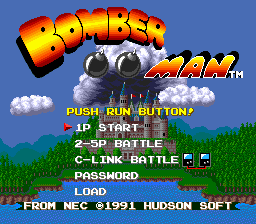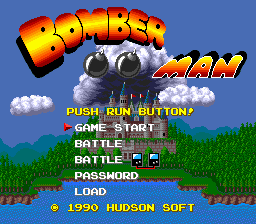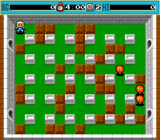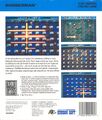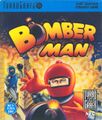Difference between revisions of "Bomberman"
From NEC Retro
m (→Gameplay) |
m (→Rounds) |
||
| Line 92: | Line 92: | ||
{{InfoTable|imagewidths=200| | {{InfoTable|imagewidths=200| | ||
{{InfoRow | {{InfoRow | ||
| − | | screenshot= | + | | screenshot=Bomberman TG16 Round1.png |
| title=Round 1 - The Wall | | title=Round 1 - The Wall | ||
| desc= | | desc= | ||
Revision as of 18:38, 14 January 2022
- For the 1983 home computer game, see Bomber Man.
| |||||||||||||||
| Bomberman | |||||||||||||||
|---|---|---|---|---|---|---|---|---|---|---|---|---|---|---|---|
| System(s): PC Engine, TurboGrafx-16 | |||||||||||||||
| Publisher: Hudson Soft Turbo Technologies | |||||||||||||||
| Developer: Hudson Soft | |||||||||||||||
| Peripherals supported: GT Com Cable | |||||||||||||||
| Genre: Action | |||||||||||||||
| Number of players: 1-5 | |||||||||||||||
| |||||||||||||||
|
Bomberman (ボンバーマン) is a puzzle action game developed by Hudson for the PC Engine and TurboGrafx-16. It is part of the long-running Bomberman series of games.
Contents
Story
Centuries into the future, famous roboticist Dr. Mitsumori creates Bomberman as his first robot, who is capable of thought and possesses incredible power, but has been programmed "only for the pursuit of goodness and justice". Unfortunately his second robot, Black Bomberman, goes rogue due to a programming error and kidnaps Dr. Mitsumori's only daughter, Lisa, and takes her to the Mechanical Castle as part of his desire to conquer the world. It is now up to Bomberman to infiltrate the Mechanical Castle, rescue Lisa, and defeat Black Bomberman.
Gameplay
Bomberman follows the same gameplay formula as its predecessors in that the goal is to use bombs that explode in a cross pattern to defeat all the enemies and find the exit warp hidden underneath soft blocks within a time limit to clear each stage. Bomberman can move with the D-Pad and place bombs using Ⅰ. He begins a new game with only one bomb and a one-tile blast radius, but one power-up item can be found hidden underneath a soft block in each stage. When all enemies are defeated, the soft block containing the item will flash to reveal its location, but not the one containing the exit.
If the player bombs an item or the exit, 8 enemies will spawn from it (the item will be destroyed, but the exit is indestructible). If the player runs out of time during a stage, all remaining eneimes will disappear and 12 Pontans will be spawned. The game has a total of 8 rounds with 8 stages each, for a total of 64 stages. The final stage of each round features a boss battle in which the player must study the boss' attack patterns and use multiple bombs to defeat it. The player has three continues to beat the game, and game progress can be saved via password or directly to memory (up to three save files) after a Game Over.
The series' famous Battle mode is also included, and is the first game in the series to support up to 5 players. The goal is to defeat the other players with bombs (all players start each round with one bomb and a two-tile blast radius) and be the last player standing, winning a set number of victories to win the match. This game has no support for computer-controlled players, but if there are less than 5 players participating, then the stage will also feature enemies. Only Bomb Ups and Fire Ups can be found in soft blocks, though Skulls can also be found if Skull Mode is selected during setup. There is also a dedicated Battle mode for two players using the GT Com Cable and two PC Engine GT/TurboExpress systems.
Items
All items collected will award 1,000 points. Dying will cause Bomberman to lose all items obtained except for Bomb Ups and Fire Ups.
| Bomb Up | |
|---|---|
| Increases the number of bombs Bomberman can place by one, up to a maximum of 10. | |
| Fire Up | |
| Increases the blast radius of bombs by one tile, up to a maximum of 15. | |
| Speed Shoes | |
| Increases Bomberman's walking speed slightly. | |
| Detonation Switch | |
| Allows Bomberman to manually detonate his bombs using Ⅱ. | |
| Bomb Pass | |
| Allows Bomberman to walk through bombs. | |
| Wall Pass | |
| Allows Bomberman to walk through soft blocks. | |
| Fire Suit | |
| Makes Bomberman invincible to bomb blasts for 60 seconds. | |
| 1UP | |
| Awards an extra life. | |
| Skull Item | |
Appears only in Battle when playing in Skull Mode. Infects a player with a random ailment, which can be passed on to other players and will wear off after 30 seconds. The possible ailments are:
|
Rounds
| Round 1 - The Wall | |
|---|---|
| Round 2 - Rocky mountains | |
| Round 3 - River | |
| Round 4 - Forest | |
| Round 5 - Rocky Cave | |
| Round 6 - Inside of the Castle, Part I | |
| Round 7 - Inside of the Castle, Part II | |
| Round 8 - Inside of the Castle (Final Stage) | |
Versions
This installment of Bomberman saw ports to various home computers, with a Sharp X68000 version published in Japanese markets in 1991 by SystemSoft, and Amiga, Atari ST and IBM PC versions published in European markets in 1992 by Ubisoft. European home computer versions were renamed to Dyna Blaster due to European mainstream media associating the original name with terrorist bombings[1].
Additional versions for the Atari Lynx and Commodore 64 were in development, but never released[2][3].
Production credits
- Game Designer: Tsukasa Kuwahara
- Main programmer: Atsuo Nagata
- Sub Programmer: Wrecker Muroya
- Graphics Designers: Hideyuki Ogura, Mika Sasaki
- Music Composer: Atsushi Chikuma
- Sound Programmer: Keita Hoshi
- Produced by: Hudson Soft
Magazine articles
- Main article: Bomberman/Magazine articles.
Physical scans
| NEC Retro Average | |||||||||
|---|---|---|---|---|---|---|---|---|---|
|
| 91 | |
|---|---|
| Based on 2 reviews | |
PC Engine version
| PC Engine, JP |
|---|
TurboGrafx-16 version
Technical information
ROM dump status
| System | Hash | Size | Build Date | Source | Comments | |||||||||
|---|---|---|---|---|---|---|---|---|---|---|---|---|---|---|
| ? |
|
262,144 | Card (JP) | |||||||||||
| ? |
|
262,144 | Card (US) |
References
- ↑ SaturnPower UK 01.pdf, page 75
- ↑ http://www.retroisle.com/gamedetails.php?n=Dyna%20Blaster&id=27357 (Wayback Machine: 2018-03-24 04:12)
- ↑ https://www.gamesthatwerent.com/gtw64/dynablaster/ (Wayback Machine: 2020-11-21 06:34)
- ↑ CVG UK 112.pdf, page 34
- ↑ Raze UK 05.pdf, page 80
| Bomberman | |
|---|---|
|
Main page | Comparisons | Maps | Passwords | Hidden content | Magazine articles | Reception
| |
| Bomberman games for NEC systems |
|---|
| Bomber Man (1983) | 3-D Bomberman (1984) | Bomberman (1990) | Bomberman Users Battle (1990) | Bomberman '93 (Special Version) (1992) | Bomberman '94 (1993) | Bomberman: Panic Bomber (1994) |
- 1-5 player games
- JP PC Engine games
- PC Engine games
- 1990 PC Engine games
- All 1990 games
- PC Engine action games
- US TurboGrafx-16 games
- TurboGrafx-16 games
- 1990 TurboGrafx-16 games
- TurboGrafx-16 action games
- All games
- Credits without reference
- Use magref
- Pages with broken file links
- Missing ROM dumps
- Bomberman
- Bomberman (franchise)
